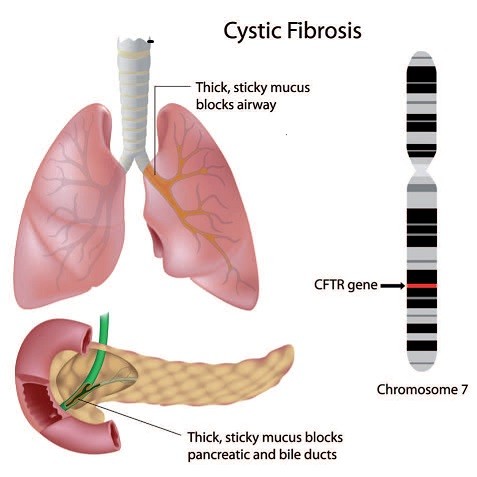Especially in males with reproductive problems, what is of particular importance is that a specific type of mutations in the CFTR gene lead to congenital bilateral absence of the vas deferens (CBAVD), with clinical symptoms of obstructive azoo/oligospermia. CBAVD is responsible for ~1.5% of male infertility in general and ~ 80% of patients with CBAVD harbor at least one mutation in the CFTR gene. Thus, in men with obstructive azoospermia, and especially in the context of preparation for IVF, the possible existence of cystic fibrosis mutations should be investigated specifically in order to confirm this type of abnormality, through a specially adapted genetic analysis. Furthermore, genetic testing in this context is also important, since if a mutation is detected in the male partner and due to the high frequency of disease carriers in the population (1 in 25), immediate genetic testing of the female partner should follow, through extended testing for> 99% of mutations, in order to determine the couple’s risk for having an affected child.
There are two particular issues to consider in genetic testing for cystic fibrosis:
- mutation carriers are perfectly healthy, with no clinical symptoms and therefore not easily recognizable, and
- the CFTR gene is relatively large in size with many possible mutations (> 1800)
Furthermore, mutations in the gene are not identical in frequency across all populations, with very significant differences, for example, between the peoples of Northern Europe and the Mediterranean. Due to the large number and also the difference in frequency of mutations in various populations-ethnic groups, it is almost impossible to design a specific group-number of mutations to be tested worldwide. Genetic testing for CF carrier detection is recommended to be performed at a level of approximately 85% of classic pathogenic mutations in the population. This level of mutation detection ensures that, if one reproductive partner is found negative after this level of testing, there is no need for the other partner to be tested, as the risk of the couple having an affected child is then greatly reduced to ~1/17,000 (from ~1/2800, which is the general risk in the Greek population).
For all the above reasons and in line with established international guidelines we perform routine CF carrier detection through a specially designed test, which incorporates many Greek CF mutations (a total of 59 mutations are analyzed), thus covering ~87% of classic CF mutations in the Greek population (approximately the same or greater level of detection is afforded for most other European Caucasian poulations).
In diagnostic and special high-risk cases (e.g. one reproductive partner is a carrier), or in males with obstructive azoospermia, it is recommended to apply extended genetic testing through full DNA sequence analysis of the entire CFTR gene, for the detection of >99% of disease mutations.
It should be noted that according to international guidelines and recommendations, and regardless of the cost, extended genetic testing of the entire CFTR gene is not recommended as a routine test for carrier detection in the population, as it very often reveals mutations which are not pathogenic, thus leading to unwarranted anxiety and unnecessary further tests.
InterGenetics participates with great success in the external quality assessment scheme organized by the European Molecular Genetics Quality Network (EMQN) – CF Network, which is periodically applied for Cystic Fibrosis
